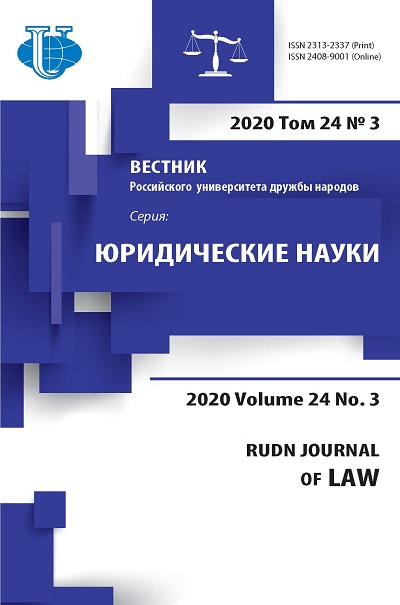PRE-TRIAL PROCEDURE FOR QUALIFYING INFORMATION MATERIALS AS EXTREMIST AS A CONDITION FOR APPLYING TO COURT
- 作者: Zhenetl S.Z.1
-
隶属关系:
- Russian State University of Justice
- 期: 卷 24, 编号 3 (2020)
- 页面: 735-759
- 栏目: PROCEDURAL LAW. PROSECUTOR SUPERVISION
- URL: https://journal-vniispk.ru/2618-897X/article/view/327003
- DOI: https://doi.org/10.22363/2313-2337-2020-24-3-735-759
- ID: 327003
如何引用文章
全文:
详细
The article is devoted to the pre-trial procedure for qualifying information, information materials, posted on information and telecommunication networks, including the Internet, as extremist and prohibited for distribution as a condition for applying to court. The object of the study was a complex of public relations aimed at countering extremism. As a result of the study, the author concluded that part of the complex of preventive measures, carried out by the authorized bodies in order to counter extremism, can be assessed by the court as a pre-trial procedure for qualifying information as extremist. The author draws attention to the lack of certainty in the terms “extrajudicial procedure” and “pre-trial procedure”, which requires improvement of the legislation; the need to determine the mechanism of pre-trial procedure of applying to court by establishing criteria, specific and sufficient actions of the authorized bodies to apply to court.
作者简介
Svetlana Zhenetl
Russian State University of Justice
编辑信件的主要联系方式.
Email: 25.12@mail.ru
Doctor of Legal Sciences, Professor of Civil and Administrative Proceedings
69 Novocheremushkinskaya str., 117418, Moscow, Russian Federation参考
- Argounov, A.V. (2015) In Search of the due process for consideration of cases on recognition of informational materials as extremist. Herald of Civil Procedure. 6. 23–41. (in Russian).
- Galyashina, E.I. (2018) Forensic examination of extremist materials: problems of methodological and information support. Courier of the Kutafin Moscow State Law University (MSAL). 7. 25–41. (in Russian). doi: 10.17803/2311-5998.2018.47.7.025-041.
- Bagyly, S.T. (2019) Polozhitelniye i otricatelniye aspekti vliyaniya informacionnih tehnologii na civilisticheskii process [Positive and negative aspects of the impact of information technology on the civil process]. Problems of legal proceedings in the court of first instance in civil, arbitration and administrative cases. Collection of articles on the materials of the International scientific and practical conference. St. Petersburg. 53–58. (in Russian).
- Byvaltseva, S.G., Makarova, N.G. (2018) The peculiarities of consideration of a statement of a public prosecutor admitting information dissiminated through the Internet to be prohibited for distribution]. Legality. 10. 17–19. (in Russian).
- Byvaltseva, S.G., Makarova, N.G. (2019) An Analysis of the Bill on Introduction of Amendments to the Administrative Procedure Code of the Russian Federation Concerning the Procedure for Review of Prosecutor’s Claims for Acknowledging Prohibited the Information Distributed in the Internet. Administrative Law and Procedure. 4. 40–44. (in Russian).
- Deeva, A.K., Korobeinik, V.A. (2018) Ekstremistskaya deyatelnost v seti Internet [Extremist activity on the Internet]. Collection of articles on the materials of the Russian scientificpractical conference “Prevention and counteraction of the ideology of religious-political terrorism and extremism in modern Russia: problems and prospects”. NRU “BelSU”. 63–65. (in Russian).
- Dronova, Yu.A. (2019) On the significance of certain novels in the Code of administrative legal procedure of the Russian Federation. Herald of Tver state university. series: Pravo. 1 (57). 93–102. (in Russian).
- Kroz, M.V., Ratinova, N.A., Volodina, N.V. (2017) Ocenka pravoprimenitelyamiekspertnih issledovanii po delam o priznanii materialov ekstremistskimi [Assessment by law enforcement agencies of expert research on cases of recognizing materials as extremist]. Sovremennoe pravo. 3. 100–105. (in Russian).
- Kuryndin, P.A. (2018) The right to pre-trial challenge of acts and actions of administrative bodies: peculiarities of its implementation in Russia and France. Actual problems of Russian law. 4 (89). 77–94. doi: 10.17803/1994-1471.2018.89.4.077-094. (in Russian).
- Mikhailov, V. (2015) Procedura priznaniya materialov ekstremistskimi trebuet korrekcii [The procedure for recognizing materials as extremist requires correction]. Administrative law. 1. 83–88. (in Russian).
- Minashkin, A.V. (2007) Dosudebnoye i vnesudebnoye rassmotreniye sporov s uchastiyem organov publichnoi vlasti [The pre-trial and out-of-court consideration of disputes involving public authorities]. Arbitrazh and Civil Procedure. 10. 29–33. (in Russian).
- Mukhametshin, A.R. (2018) The role of the prosecutor's office in suppressing extremist manifestations and terrorist threats in holding mass events. North Caucasian Legal Bulletin. 2. 102–107. doi: 10.22394/2074-7306-2018-1-2-102-107. (in Russian).
- Panova, I.V. (2009) Administrativno-processualnoye pravo Rossii: 2-d ed [Administrative and procedural law of Russia: 2-d ed]. Moscow: Publishing house Norma Publ. (in Russian).
- Savinov, L.V., Dorozhinskaya, E.A., Sigarev, A.V. (2015) Ekspertiza spornih informacionnih (ekstremistskih) materialov: metologicheskiye i pravoviye problemi [Examination of controversial informational (extremist) materials: methodological and legal problems]. Criminological Journal of the Baikal State University of Economics and Law. 2. 209– 222. (in Russian).
- Sultanov, A.R. (2010) Application of the European standards in civil legal proceedings on an example of a problem of “extremist cases”. Solicitor. 8. 7–28. (in Russian).
- Sultanov, A.R. (2012) Yuridicheskaya priroda del o priznanii informacionnih materialov ekstremistskimi s tochki zreniya grazhdanskogo processa [The legal nature of cases for recognition information materials as extremist from the civil procedure point of view]. Solicitor. M.: The law and economics (1). 12–25. (in Russian).
- Shkobeneva, G.V. (2015) Praktika rassmotreniya grazhdanskih del o priznanii informacionnih materialov ekstremistskimi: processualniye osobennosti [The practice of considering civil cases on the recognition of information materials as extremist: procedural features]. Judge. 4. 54–56. (in Russian).
- Ulyanov, M.V. (2017) Poryadok rassmotreniya del o priznanii informacionnih materialov ekstremistskimi [Procedure for consideration of cases on recognition of information materials as extremist]. NB: Administrative law and practice of administration. 5. 31–37. (in Russian).
- Ushakov, A.S. (2016) K voprosu o primenenii Rossiiskogo zakonodatelstva o protivodeistvii ekstremistskoi deyatelnosti v otnoshenii religioznih tekstov [On the question of the application of Russian legislation on countering extremist activity in relation to religious texts]. Scientific and methodological electronic journal “Concept”. 17. 173–177. (in Russian).
补充文件








